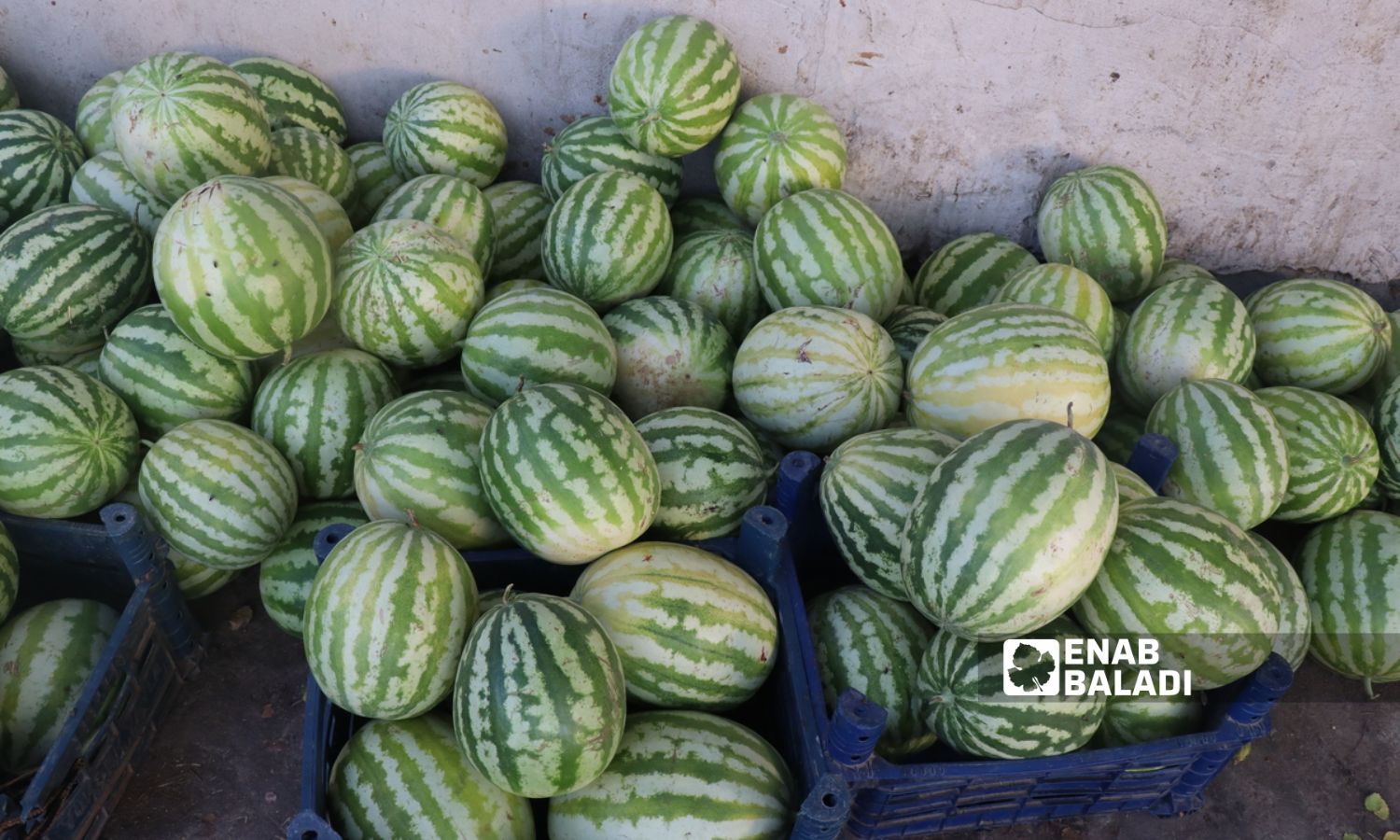



Ras al-Ain – Hussein Shaabo
Large losses were incurred by watermelon farmers in the Ras al-Ain region, northwest of al-Hasakah, due to poor quality of seeds and the inability to purchase fertilizers and medicines to treat diseases that affected the crop.
The summer watermelon season turned from an opportunity to make good profits for farmers into a season for counting losses and searching for ways to pay off the debts they had accumulated after three months of hardship between preparing for planting and reaping the crop.
Majed Saeed, a farmer in the village of Alouk in Ras al-Ain, who owns 80 dunams planted with watermelons, told Enab Baladi that he expected a bumper season, but the quality of the seeds that arrived in the area was very poor.
He added that what prompted him to buy the seeds in June, when planting began, was their acceptable price compared to other, higher-priced types.
He stated that by the time of harvesting in late August, the watermelon was of normal size, but it was not the usual color and taste, and even its seeds were infected with rot, noting that the loss rate this season reached 80%.
Saeed expressed his hope that good types of seeds will be available at a reasonable price next year so that he can recover even a small part of his loss and restore the production he is accustomed to every year.
Mohammad Attia planted 35 dunams of watermelon this season, and at the beginning of the season in Ras al-Ain, he decided to use a new type of seed based on the recommendations of merchants and the acceptable price of the seeds. (Dunam is about 900 m2)
Attia added to Enab Baladi that the problem became clear as the watermelon fruit matured and was represented by the loss of the usual red color and sweet flavor. The farmer did not have the financial resources to secure the necessary fertilizer to ensure the healthy growth of the crop.
About 90% of the crop production was damaged this year, he said, estimating his loss at about $4,250 after accumulating debts. Now, he is waiting for the cotton season, hoping that it would solve a small part of the problem.
Samir Orwa, an agricultural engineer and owner of an agricultural pharmacy in Ras al-Ain city, said that the watermelon season faced several obstacles, the most important of which was the weakness of the plants’ roots and slow growth, despite serious attempts at treatment by providing fertilizer, care, and the necessary advice.
Orwa added to Enab Baladi that these attempts did not achieve any positive results, and after careful examination, it turned out that the seeds had rotted and that their quality was poor.
He pointed out that farmers bought this type because of its cheap price, and the price per kilo reached a US dollar at its best.
The agricultural engineer stated that the price of good hybrid seeds, known as “al-Habudi,” is $2.5.
The head of the agricultural office in the local council of Ras al-Ain, Omar Hammoud, told Enab Baladi that the area of land cultivated with watermelon this season reached 2,000 dunams.
He pointed out that some merchants took advantage of farmers’ weak financial capabilities and provided them with poor-quality seeds at low prices.
He stated that the watermelon season was very abundant over the past years and was enough to supply the Ras al-Ain area and export part of it to other Syrian regions, but it is very bad this season.
Hammoud added that the Agricultural Office warned farmers against using this type of seed, which is unknown in the region. However, many farmers bought it, which led to the damage of about 1,430 dunams of the total cultivated area.
Hammoud pointed out that most of the farmers in Ras al-Ain sold part of their agricultural lands during the last summer season in order to install artesian water pumps that operate on solar panels, the cost of which exceeded 10,000 dollars per well, in the hope that these amounts will be paid after disposal of watermelon and cotton crops this year.
if you think the article contain wrong information or you have additional details Send Correction